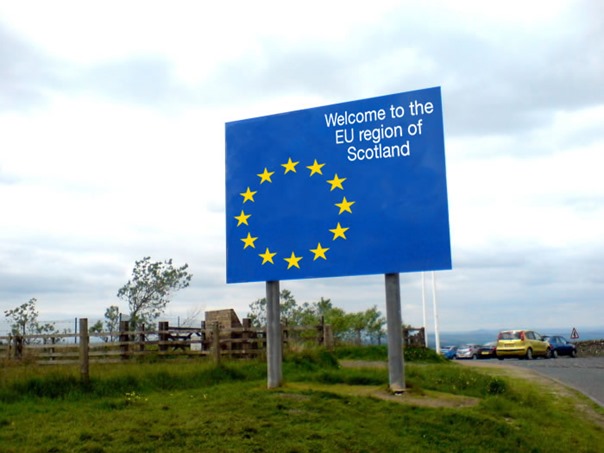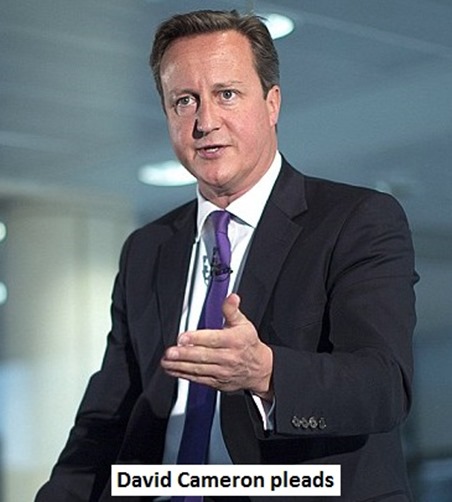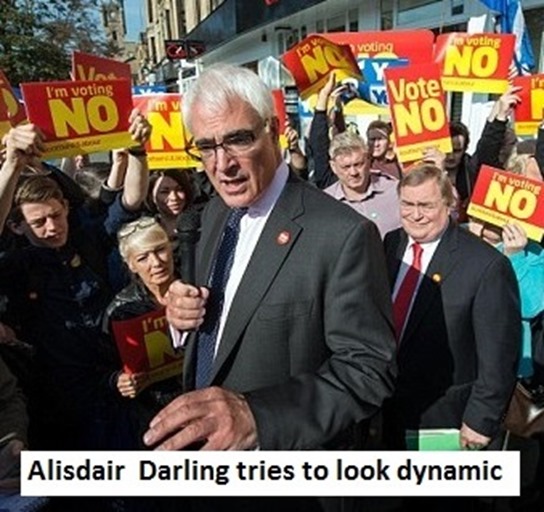Max Musson
Western Spring
September 12, 2014
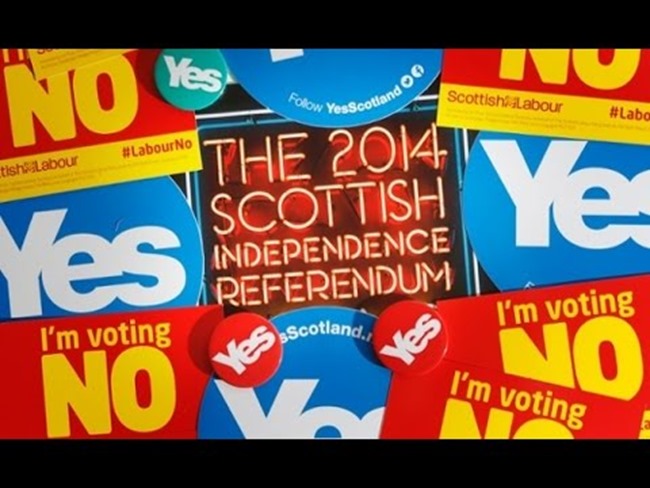
We are now just a week away from an historic vote which may very well result in a political separation of Scotland from the rest of the United Kingdom, and in the news we have David Cameron, the Prime Minister of the UK, apparently pleading with Scottish voters not to ‘break his heart’. During the last week we have in fact seen almost all of the ‘’big beasts’’ of the establishment parties venturing north of the border to similarly voice their alarm at the apparent collapse in the ‘‘No’’ vote, as the Scottish National Party’’s campaign for independence gathers pace. So what is going wrong?
The real answer to this question is that nothing is going ‘wrong’ — everything is going to plan –– everything is going ‘right’ for those who wish to see the dismemberment of the United Kingdom.
It should not escape the attention of the British electorate that all three of the main establishment parties, in addition to the Scottish National Party (SNP) are enthusiastic supporters of Britain’’s membership of the European Union, and that one of the primary objectives of the European Union is to effect the dismemberment of every member state, reducing the historic nations of Europe into small powerless regions and thus undoing the statecraft of men such as Bismark, Garibaldi, Oliver Cromwell and many others.
Under the Consolidated Treaty Establishing the European Union, i.e. the Treaty of Rome as modified by the subsequent European treaties, the implementation of the principle of ‘subsidiarity’ means that member states must devolve downwards to new regional assemblies, all of the powers that are able to be exercised on a regional level. All other powers currently enjoyed by the national governments of the member states, i.e. those that can only be exercised by a sovereign state are to be devolved upwards to the European Parliament, the European Commission and the Council of Europe in Brussels.
For anyone with any foresight or imagination it is plainly obvious that once this process is complete, the national parliaments of the member states will have no remaining powers and therefore no purpose and will then be progressively mothballed, until all that exists is a European super-state composed of hundreds of regions each one of which will be helpless to resist the diktats emanating from Brussels.
It is also obvious that the separation of Scotland from the rest of the United Kingdom is a significant step, but just the first step towards achieving that grand European plan where Britain is concerned. Should the Scots vote for independence, I predict that Plaid Cymru will begin again campaigning for independence for Wales, and then it will be the turn of Ulster and Cornwall, and so it will go on.
While Cameron claims that his heart will be broken if the Scots vote for independence, he is as I have said an enthusiastic supporter of the European Union and therefore unless he is an idiot, he must know that Scottish independence facilitates the ‘master plan’ and he therefore cannot lose. Should the Scots vote to remain within the UK he will be heralded as the man who saved the Union (for now), but if not, his colleagues in Brussels will be overjoyed.
There never was the need to hold a referendum in Scotland. The fact that the SNP have a majority of Scots MPs is cited as the reason that ‘compelled’ Cameron to agree to a referendum, but this is nonsense. If all that is needed to secede from the United Kingdom is that a majority of elected politicians in any given area demand it and call for a referendum, then it would be possible if Andrew Turner, the Conservative MP for the island supported the idea, for the Isle of Wight to demand a referendum on independence from the rest of the UK but somehow, I don’t think this would be taken seriously, or viewed sympathetically at Westminster.
Obviously, Cameron was not compelled to grant the Scots a referendum any more than he would be compelled to grant one to the Isle of Wight, and furthermore, there was no need to extend the franchise to all Scots people sixteen years of age and above. Given the naivety of impulsiveness of most sixteen-year olds, this concession is guaranteed to play to the advantage of the ‘’Yes’’ campaign. In fact virtually every aspect of the organisation of this referendum has been structured to play into the hands of the SNP.
Whereas SNP campaigning for Scottish independence has been going for decades and went into overdrive in the run up to the Scottish parliamentary elections in 2007 when the proposal for a referendum was included in their election manifesto for the first time, the ‘‘Better Together’’ campaign, arguing for a continuation of Scotland’s membership of the United Kingdom, was not announced until June 2012, and the campaign did not actually get underway until the middle of 2013. The ‘Yes’ campaign therefore has a six year advantage over the ‘No’ campaign.
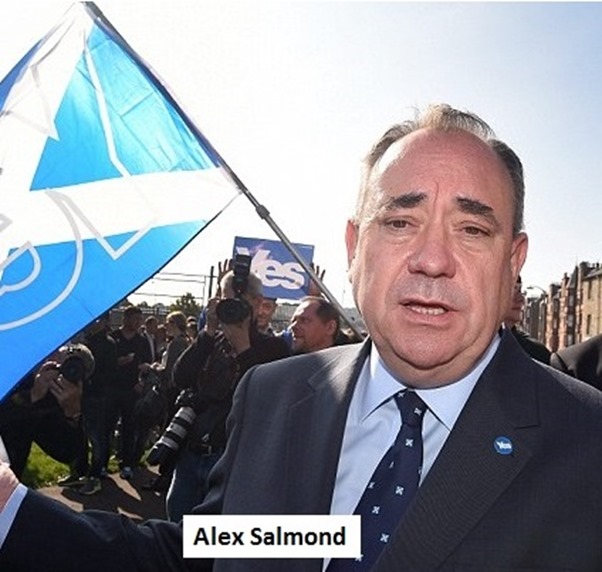
The Conservatives also gave Alex Salmond the option to choose when the referendum would be held and of course Salmond chose this autumn, in a year in which the Scotland will have hosted both the Commonwealth Games and the Ryder Cup, thereby boosting the patriotic fervour of the Scots, and a year in which they will have celebrated the 700th Anniversary of the Battle of Bannockburn, a battle in which Robert the Bruce successfully defeated King Edward II of England in June 1314, during the First War of Scottish Independence. Scottish patriotic fervour will therefore be running higher this year than at any other time for several decades.
While the ‘’Yes’’ campaign has been led by Alex Salmond and other passionate campaigners from the SNP, the ‘‘Better Together’’ campaign has been led by a relative non-entity, the dull as ditch-water, ex-Labour minister, ‘‘Mr Charisma Bypass’’, Alisdair Darling. A consequence of this is that the ‘‘Yes’’ campaign has also been far better funded than the ‘’No’’ campaign, such that by April 2013, the ‘‘Yes’’ campaign had received £1.6 million in donations compared to only £1.1 million received by the ‘’Better Together’’ campaign. Clearly therefore, this referendum campaign has not been conducted on a ‘level playing field’, and the ‘dice’ have always been loaded in favour of independence.
As I stated earlier, almost all of the ‘big beasts’ of the three main establishment parties have campaigned in Scotland recently, often clashing and undermining each other’s effectiveness and seemingly oblivious of their lack of popularity. Each visit driving the Scots increasingly into the independence camp as the SNP have presented independence as an opportunity to be free of the loathsome Westminster politicians.
Lastly, the one issue that has not been discussed and which has been presented as irrelevant, is the fact that apart from the Scots, no one else from within the UK has an opportunity to vote on this issue. The rest of us have been disenfranchised — as if the break-up of the UK is not our concern — as if there will be no negative impact upon the rest of the UK if the Scots vote for independence!
Scottish independence will of course have a massive negative impact upon the rest of the UK. The Scots will depart taking a large proportion of our North Sea oil and gas reserves; taking strategically critical ports and ship building yards; taking many of our foremost financial institutions; our North Sea and Atlantic fishing rights; and vast acreages of farmland and forest, to name just a few of the precious national assets that we will lose.
Strategically, the mainland of the British Isles will be divided in two and will therefore lose the security that its integrity provides, and the UK will be diminished in stature and suffer loss of influence in matters of foreign policy. Furthermore, the nuclear powered submarines that provide Britain’s Trident nuclear deterrent are based at the British Naval base on the Clyde and Scottish independence will have a serious impact on our defence capability.
Are these not issues over which the people of England, Wales and Northern Ireland should have a say?
The sad fact is however, that our political establishment are wedded to the idea of the European Union and therefore see nothing wrong with the dismemberment of our nation and when they plead on behalf of the Union, their words are disingenuous. They have no intention of allowing people outside of Scotland to vote in this referendum, as the shallow faux-patriotism and anti-English jingoism of the SNP would hold no appeal for us.
The ‘‘Better Together’’ campaign has been designed to deliberately fail, the Labour Party caring not for the damage they do, because they have no sense of nationhood and will be just as happy campaigning on the European stage as on our national stage, and the Conservatives are further buoyed by the prospect that they will be guaranteed a majority at Westminster after 2016 when independence takes effect.
I sincerely hope that the Scots electorate are perceptive enough to see through the nonsense spouted by Salmond and the rest of the SNP, but having observed both campaigns I fear the worst. I fear the very best we can hope for is that the ‘‘No’’ campaign will stave off independence and delay the break-up of the UK, temporarily at least, by securing a narrow majority in favour of maintaining the United Kingdom. However as we all know from previous referenda, that will not be an end to the matter and the SNP, together with our treacherous political establishment at Westminster will almost certainly contrive further ballots, turning what should be a one-off ‘referendum’ into a ‘neverendum’, until they get the result they want.
Perhaps the Scots electorate will be far more perceptive than I dare hope. Perhaps they will realise that our mutual interests are strengthened by standing together. That together we have the critical mass to exercise true self-determination in a hostile world. Perhaps they will recognise that the sister nations that make up the indigenous people of these islands have lived together for many thousands of years — that in essence we are one people – and that our political union has seen us through many trials and tribulations over the last 300 years. I hope so, for the sake of our children’s future, for our sake now, in memory everything our ancestors worked in unison to achieve, for auld lang syne, I hope so.
